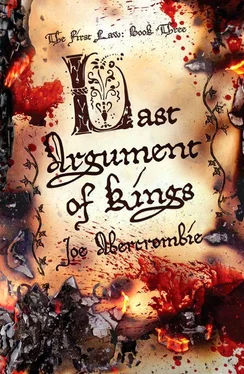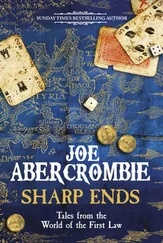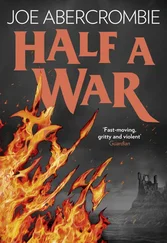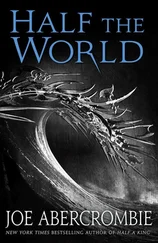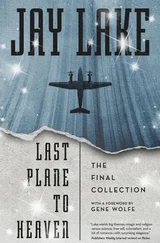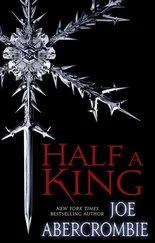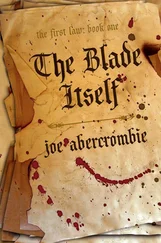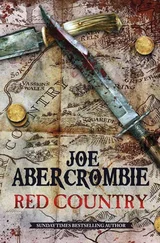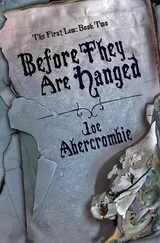Their words tickled at his ears.
“It’s him.”
“Ninefingers.”
“The Bloody-Nine!”
A circle of fear, with him at the centre, and they were wise to fear.
Their deaths were written in the shapes of sweet blood on the bitter ground. Their deaths were whispered in the buzzing of the flies on the corpses beyond the wall. Their deaths were stamped on their faces, carried on the wind, held in the crooked line between the mountains and the sky. Dead men, all.
“Who’s next to the mud?” he whispered.
A bold Carl stepped forward, a shield on his arm with a coiled serpent upon it. Before he could even lift his spear the Bloody-Nine’s sword had made a great circle, above the top of his shield and below the bottom of his helmet. The point of the blade stole the jawbone from his head, cleaved into the shoulder of the next man, ate deep into his chest and drove him into the earth, blood flying from his silent mouth. Another man loomed up and the sword fell on him like a falling star, crushed his helmet and the skull beneath it down to his mouth. The body dropped on its back and danced a merry jig in the dirt.
“Dance!” laughed the Bloody-Nine, and the sword reeled around him. He filled the air with blood, and broken weapons, and the parts of men, and these good things wrote secret letters, and described sacred patterns that only he could see and understand. Blades pricked and nicked and dug at him but they were nothing. He repaid each mark upon his burning skin one-hundred fold, and the Bloody-Nine laughed, and the wind, and the fire, and the faces on the shields laughed with him, and could not stop.
He was the storm in the High Places, his voice as terrible as the thunder, his arm as quick, as deadly, as pitiless as the lightning. He rammed the sword through a man’s guts, ripped it back and smashed a man’s mouth apart with the pommel, snatched his spear away with his free hand and flung it through the neck of a third, split a Carl’s side yawning open as he passed. He reeled, spun, rolled, drunken dizzy, spitting fire and laughter. He forged a new circle about him. A circle as wide as the giant’s sword. A circle in which the world belonged to him.
His enemies lurked beyond its limit now, shuffled back from it, full of fear. They knew him, he could see it in their faces. They had heard whispers of his work, and now he had given them a bloody lesson, and they knew the truth of it, and he smiled to see them enlightened. The foremost of them held up his open hand, bent forward and laid his axe down on the ground.
“You are forgiven,” whispered the Bloody-Nine, and let his own sword clatter to the dirt. Then he darted forward and seized the man by his throat, lifting him up into the air with both his hands. He thrashed and kicked and wrestled, but the Bloody-Nine’s red grip was the swelling ice that bursts the very bones of the earth apart.
“You are forgiven!” His hands were made of iron, and his thumbs sunk deeper and deeper into the man’s neck until blood welled up from under them, and he lifted the kicking corpse out to arm’s length and held it above him until it was still. He flung it away, and it fell upon the mud and flopped over and over in a manner that greatly pleased him.
“Forgiven…” He walked to the bright archway through a cringing crowd, shying away like sheep from the wolf, leaving a muddy path through their midst, strewn with their fallen shields and weapons. Beyond, in the sun, bright-armoured horsemen moved across the dusty valley, their swords twinkling as they rose and fell, herding running figures this way and that, riding between the high standards, rippling gently in the wind. He stood in that ragged gateway, with the splintered doors under his boots, and the corpses of his friends and of his enemies scattered about him, and he heard the sounds of men cheering victory.
And Logen closed his eyes, and breathed.
In spite of the hot summer day outside, the banking hall was a cool, dim, shadowy place. A place full of whispers, and quiet echoes, built of sharp, dark marble like a new tomb. Such thin shafts of sunlight as broke through the narrow windows were full of wriggling dust motes. There was no smell to speak of. Except the stench of dishonesty, which even I find almost overpowering. The surroundings may be cleaner than the House of Questions, but I suspect there is more truth told among the criminals.
There were no piles of shining gold ingots on display. There was not so much as a single coin in evidence. Only pens, and ink, and heaps of dull paper. Valint and Balk’s employees were not swaddled in fabulous robes such as Magister Kault of the Mercers had worn. They did not sport flashing jewels as Magister Eider of the Spicers had. They were small, grey-dressed men with serious expressions. The only flashing was from the odd pair of studious eye-glasses.
So this is what true wealth looks like. This is how true power appears. The austere temple of the golden goddess. He watched the clerks working at their neat stacks of documents, at their neat desks arranged in neat rows. There the acolytes, inducted into the lowest mysteries of the church. His eyes flickered to those waiting. Merchants and moneylenders, shopkeepers and shysters, traders and tricksters in long queues, or waiting nervously on hard chairs around the hard walls. Fine clothes, perhaps, but anxious manners. The fearful congregation, ready to cower should the deity of commerce show her vengeful streak.
But I am not her creature. Glokta shouldered his way past the longest queue, the tip of his cane squealing loud against the tiles, snarling, “I am crippled!” if one of the merchants dared to look his way.
The clerk blinked at him when he reached the front of the line. “How may I—”
“Mauthis,” barked Glokta.
“And who shall I say is—”
“The cripple.” Convey me to the high priest, that I might cleanse my crimes in banking notes.
“I cannot simply—”
“You are expected!” Another clerk, a few rows back, had stood up from his desk. “Please come with me.”
Glokta gave the unhappy queue a toothless leer as he limped out between the desks toward a door in the far, panelled wall, but his smile did not last. Beyond it, a set of high steps rose up, light filtering down from a narrow window at the top.
What is it about power, that it has to be higher up than everyone else? Can a man not be powerful on the ground floor? He cursed and struggled up after his impatient guide, then dragged his useless leg down a long hallway with many high doors on either side. The clerk leaned forward and humbly knocked at one, waited for a muffled “Yes?” and opened it.
Mauthis sat behind a monumental desk watching Glokta hobble over the threshold. His face could have been carved from wood for all the warmth or welcome it displayed. On the expanse of blood-coloured leather before him pens, and ink, and neat piles of papers were arranged with all the merciless precision of recruits on a parade ground.
“The visitor you were expecting, sir.” The clerk hastened forward with a sheaf of documents. “And there are also these for your attention.”
Mauthis turned his emotionless eyes to them. “Yes… yes… yes… yes… all these to Talins…” Glokta did not wait to be asked. And I’ve been in pain for far too long to pretend not to be. He took a lurching step and sagged into the nearest chair, stiff leather creaking uncomfortably under his aching arse. But it will serve.
The papers crackled as Mauthis leafed through them, his pen scratching his name at the bottom of each one. He paused at the last. “And no. This must be called in at once.” He reached forward and took hold of a stamp, its wooden handle polished by long use, and rocked it carefully in its tray of red ink. It thumped down against the paper with a disturbing finality. And is some merchant’s life squashed out under that stamp, do we suppose? Is that ruin and despair, so carelessly administered? Is that wives and children, out upon the street? There is no blood here, there are no screams, and yet men are destroyed as completely as they are in the House of Questions, and with a fraction of the effort.
Читать дальше
